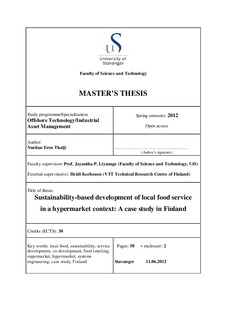| dc.description.abstract | Food retailing is one of the most diverse and dynamic sectors in developed societies, offering a seemingly increasing range of food and services to consumers. Food retailers have recently started taking sustainable initiatives according to their business rationales. Local food is one of these initiatives, which means growing, producing and consuming food in the same region. The reason behind retailers’ support for local food routes into the retailer market is increased customer demand and response to public criticism.
The following business needs should therefore be considered when local food is examined in a large food retailer, hypermarket, context: i) the need for sustainability performance measures for local food service scenario assessment in order to meet the customer’s and public’s expectations, ii) the need for co-development of local food service in order to stabilize demand and supply of local food, and iii) the need for a marketing concept in order to visualize the values associated with local food.
The purpose of the thesis is to introduce sustainability aspects and operationalize sustainability by involving these in the local food service development process in a hypermarket.
The case hypermarket has been purposefully selected in order to investigate the service development needs and validate the developed model in a real context. The hypermarket is located in the Lahti region, Finland.
The thesis has two main results: a sustainability-enhanced local food (SELF) development model and an enhanced local food service (LFS) scenario with a co-developed marketing concept and sustainability performance indicators.
Its implication is in terms of considering sustainability in stakeholders’ needs, sustainability assessment criteria, an LFS scenario, service concepts, functions, and sustainability performance indicators. Taking into account the stakeholders’ needs and perspective on sustainability, developing recognizable and understandable sustainability measures for them and presenting co-development platforms enhances a common understanding of sustainability and lets it be alive, dynamic and adds value for stakeholders in retailing. As the common understanding matures, commitment and support for sustainable actions increase. Hypermarkets have the advantage of connecting consumers and local producers at this point. They have the power to shape the market in a sustainable way. | no_NO |
